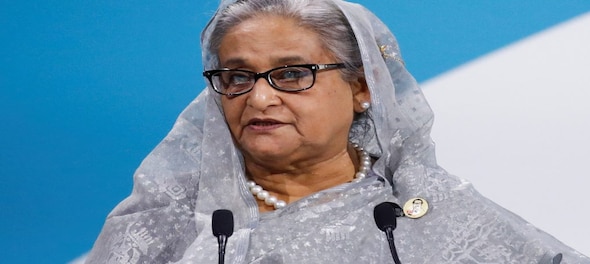
Bangladesh Prime Minister Sheikh Hasina has achieved an unprecedented fourth consecutive term as her Awami League party secured a resounding majority in the general elections. The Awami League clinched 223 seats out of the 300-member Parliament.
The Jatiya Party, the main opposition, managed to secure only 11 seats, while the Bangladesh Kallyan party won in a single constituency. Independent candidates emerged victorious in 62 seats, with the Jatiya Samajtantrik Dal and the Workers Party of Bangladesh each winning one seat.
Securing a landslide victory in the Gopalganj-3 constituency, Hasina, 76, who also serves as the president of the Awami League, has now won her eighth term as a Member of Parliament. With this triumph, Sheikh Hasina is poised to become the longest-serving prime minister in Bangladesh since its independence.
#WATCH | Bangladesh Prime Minister Sheikh Hasina addresses the media at her residence Ganabhaban in Dhaka, Bangladesh.
— ANI (@ANI) January 8, 2024
She was elected as the Prime Minister for the fifth time in the general elections conducted yesterday. pic.twitter.com/RELohNIkAa
Daughter of Sheikh Mujibur Rahman, the leader during Bangladesh's 1971 Liberation War, Hasina spent her early life in Tungipara in the then East Bengal and later in Segunbagicha when the family moved to Dhaka. She entered politics as the vice-president of Eden College's Students Union in 1966-1967.
Tragedy struck in 1975 when Hasina lost her family to a military coup, with her mother, three brothers, and father being killed by a group of young army personnel. At the time, Hasina, her husband Wazed Miah, and her sister were in Europe. Seeking political asylum, she lived in exile with surviving family members for six years under the protection of then Indian Prime Minister Indira Gandhi.
Ziaur Rahman's military government initially barred Hasina from returning to Bangladesh. However, she came back in 1981 after being elected president of the Awami League. Despite participating in the 1986 general elections under martial law imposed by President Hussian Muhammad Ershad, Hasina and her eight-party alliance resigned a year later, paving the way for a fresh election under a neutral government.
This effort eventually succeeded, and Bangladesh returned to a parliamentary form of government in 1991.
Sheikh Hasina first became prime minister in June 1996, completing a term marked by political unrest. Following her defeat in the 2006 elections to Zia and the BNP, she faced arrest during the 2007 emergency but was released in 2008 when the emergency was lifted.
Making a triumphant return, she secured a significant victory in the 2008 general elections and continued her political dominance with a landslide win in the 2019 polls.
Hasina earned acclaim for her adept handling of the world's most significant refugee crisis, with over a million Rohingyas seeking refuge in Bangladesh following their escape from persecution in neighbouring Myanmar during a 2017 army crackdown in their homeland.
Beyond her political achievements, Hasina is a mother to a daughter specialising in mental health and a son who serves as her ICT affairs adviser, bringing expertise in information and communication technology. Her late husband was a nuclear scientist, adding another dimension to her family's history.
First Published: Jan 8, 2024 3:54 PM IST
Check out our in-depth Market Coverage, Business News & get real-time Stock Market Updates on CNBC-TV18. Also, Watch our channels CNBC-TV18, CNBC Awaaz and CNBC Bajar Live on-the-go!


Telangana CM violated poll code, defer Rythu Bharosa payment, says Election Commission
May 7, 2024 9:01 PM
Lok Sabha Election 2024: How Indian political parties are leveraging AI
May 7, 2024 6:59 PM

